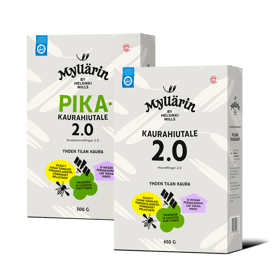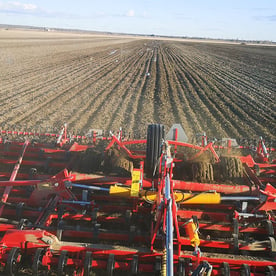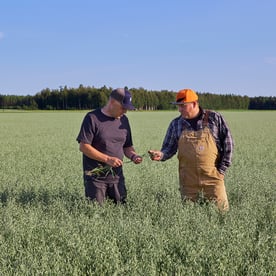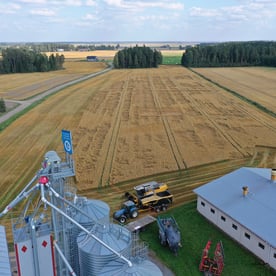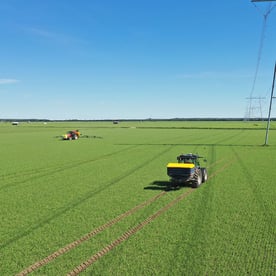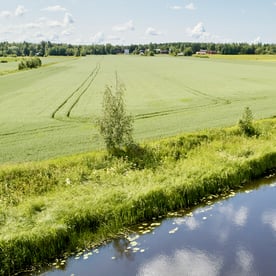The first Oats 2.0 hit the shelves and the second crop is sown
Spring has leapt forward, even though a rather severe winter storm surprised those who had already started their spring farming tasks. We asked how the sowing of Oats 2.0 is progressing on the Mäki-Latvala farm. At first it looked like the fields would be ready early, but then cold weather and flooding brought delays.
The spring floods were exceptionally heavy in Ilmajoki. Hundreds of hectares in the area so drowned they were fit for boating. In addition to the floods, the start of sowing was further delayed by the fact that most of the fields had been left fallow in the autumn due to wet weather.
GRAIN VARIETY AFFECTS THE MOUTHFEEL OF PORRIDGE
This harvest season, the main varieties sown in Oats 2.0 are the large-grain Avenue and Proxy oats. "Choices made at the growing stage influence the way the porridge feels in the mouth. These varieties produce smooth porridge," says farmer Mikko Mäki-Latvala from the edge of the sowing field. The cultivars were selected in collaboration with the mill and the farmer.
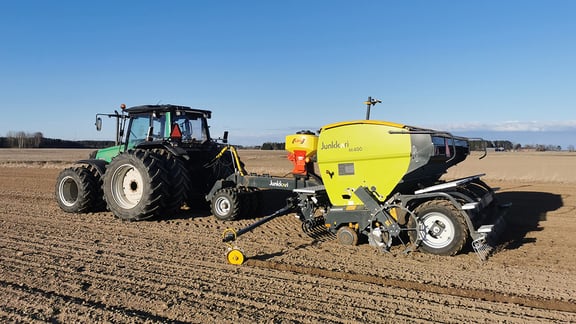
1,000 KILOMETRES IN A TRACTOR CAB
Mäki-Latvala estimates that he sat in the cab of the tractor for about 1,000 kilometres while sowing the Oats 2.0. With the help of automation, the tractor maintains driving lines within four centimetres, but the sowing still requires some sitting muscles. "The automation keeps the driving line straight and I can concentrate on controlling the machine." 7
Obstacles, such as a Northern lapwing nests full eggs, are circled by humans. According to Mäki-Latvala, nests are usually easy to spot, as the Northern lapwing is a brave and persistent bird. It will lie on its eggs, no matter how close the machine approaches, and thus reveal its nest.
ENHANCING SOIL AND NATURE
At the time of the interview, the field that is being worked is the culmination of many aspects of the Oats 2.0 production method. "The pre-crop here has been pea, which is a pollinator-friendly, flowering crop. It has sequestered tens of kilos per hectare of the nitrogen needed by oats. Without peas, about 75-80 kilograms of nitrogen per hectare would have to be applied at sowing, now 50 kilograms is enough".
This year, the Mäki-Latvala farm has a new pneumatic catch crop sowing machine. Using it, the seeds of ryegrass and Dutch clover are spread among the oats. Dutch clover absorbs nitrogen, one of the most common elements in the world, from the atmosphere to feed the oats. Ryegrass sequesters carbon and accumulates organic matter in the soil.
The tour of the Mäki-Latvala farm includes turnip rape and peas. The Mäki-Latvala farm tour introduces you to turnip rape and peas.

FERTILISATION ACCORDING TO GROWTH POTENTIAL
The plant is fertilised when it is sown, but not blindly as in the old days, when the same amount of fertiliser was applied across the field. Oats 2.0 are cultivated using targeted fertilisation. Mäki-Latvala applies 70 % of the fertiliser during sowing.
During the growing season, compensatory fertilisation is distributed to the field on the basis of a crop map generated by satellite imagery. This allows the farmer to monitor the colour and biomass of the plant. Fertilisation needs are measured from chlorophyll.
Even the worst sites can be brought to vigour by early compensatory fertilisation, but at the end of the season, weaker crops are not fertilised at all and efforts are directed to where the best growth potential is.
WAITING FOR THE MIRACLE OF GERMINATION
"It's exciting to go around the fields and monitor the success of the sowing and possible sowing mistakes. With oats, it's nice to be able to enjoy the wonder of green shoots without immediately worrying about pests. For example, turnip rape is a different story.”
With the right amount of moisture and warmth, signs of germination will appear underground within a few days. It will take a week before the ground starts to green up.
"So far, the heat in the tractor cab has been turned up, but now it's getting warmer," sighs Mikko Mäki-Latvala and continues sowing.
We will visit the Mäki-Latvala farm again as the growing season progresses.
LEARN ABOUT THE OATS 2.0 PRODUCTS AND FARMING METHODS